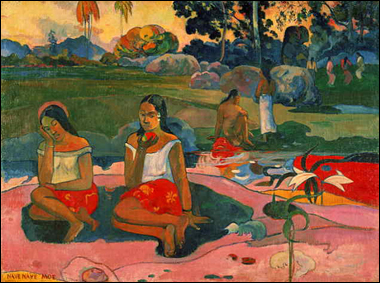Paul Gauguin & The Marquesas: Paradise Found?

While the work produced by Gauguin in Tahiti has been extensively catalogued and analyzed over the past century, his last years in Atuona on the island of Hiva Oa in the Marquesas have received only glancing attention.
Focusing on the painter’s art and writing from this period, Caroline Boyle-Turner and Maia Nuku will discuss Gauguin’s deep engagement with questions of traditional Marquesan beliefs, colonial and church authority and changing definitions of “exotic”.
USING IMAGES, Our speakers will also explore the challenges that the artists faced to intercede, invent, interpret or even ignore these complicated and often conflicting issues as he developed a powerful and poetic body of art.
In English. Free and open to the public. No RSVP necessary.
Dr. Caroline Boyle-Turner has studied and written about Gauguin and the Pont-Aven group of artists since the late 1970s. Her doctoral dissertation on Paul Sérusier (Columbia University, New York), was published in 1983. Six other books and exhibition catalogs followed: Paul Gauguin and his circle in Brittany; The Prints of the Pont-Aven School (1986) which was translated into French, German, Hebrew and Japanese; Paul Sérusier, la technique, l’oeuvre peint (1988); Jan Verkade (1989, Van Gogh Museum and Quimper, Musée des Beaux-Arts); Les Nabis (1993) and Sérusier et la Bretagne (1995). As founder and director of the Pont-Aven School of Contemporary Art (1993-2008), she focused on teaching and bringing together 3rd and 4th year art students from all over the world to create in Pont-Aven. Recently, she has recently published Paul Gauguin & les Marquises : Paradise Found? (Éditions Vagamundo, French edition translated by Belem Julien). Now Based in Pont-Aven (Brittany), she is president of the Comité Paul Sérusier.
Born in London of English and Maori (Ngai Tai) descent, Maia Nuku’s doctoral research focused on early missionary collections of Polynesian gods and their extraordinary materiality which sparked an interest in drawing out the often eclipsed cosmological aspects of Oceanic art. She followed up her involvement on the major exhibition Pacific Encounters: Art and Divinity in Polynesia 1760–1860 at the Sainsbury Centre for Visual Arts (2006) with postdoctoral research at Cambridge University’s Museum of Archaeology and Anthropology as part of a collaborative research team exploring Oceanic collections in major European institutions – Artefacts of Encounter: 1765–1840 and Pacific Presences: Oceanic Art in European Museums. She now lives in New York where she is Evelyn A. J. Hall and John A. Friede Associate Curator for Oceanic Art at the Metropolitan Museum of Art.
Born in London of English and Maori (Ngai Tai) descent, Maia Nuku’s doctoral research focused on early missionary collections of Polynesian gods and their extraordinary materiality which sparked an interest in drawing out the often eclipsed cosmological aspects of Oceanic art. She followed up her involvement on the major exhibition Pacific Encounters: Art and Divinity in Polynesia 1760–1860 at the Sainsbury Centre for Visual Arts (2006) with postdoctoral research at Cambridge University’s Museum of Archaeology and Anthropology as part of a collaborative research team exploring Oceanic collections in major European institutions – Artefacts of Encounter: 1765–1840 and Pacific Presences: Oceanic Art in European Museums. She now lives in New York where she is Evelyn A. J. Hall and John A. Friede Associate Curator for Oceanic Art at the Metropolitan Museum of Art.

